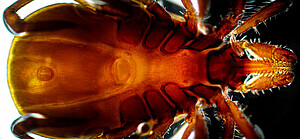Lyme disease, also known as Lyme borreliosis, is an infectious disease caused by the bacteria named Borrelia burgdorferi and accidently transmitted by the bite of an infected tick Ixodes. It is, in the first place, an illness of the animal world (zoonosis). Depending on the year, Lyme disease, well known by forest workers and hikers, affects around 25.000 to 40.000 persons annually in France.
In moderate occidental climate, the contagion takes place in the daytime and outdoors and it has got two activity peaks, one in spring and one in autumn. On 29 September 2016, the government presented its plan to fight the disease. Besides a prevention campaign destined to greater public and the promotion of awareness among doctors, this plan also includes the development of research: a new cohort of patients, the improvement of the diagnosis as well as the introduction of a programme learn about the diseases transmitted by ticks.
On a national level, the University of Strasbourg disposes of a real expertise in borreliosis. At first, Alsace is especially concerned: around 3000 persons are affected and about 10-20% of ticks carry the bacteria. Above all, the Centre national de référence (CNR) de la borréliose, involving several research teams in physiopathology, analytical chemistry, clinical medicine and medical microbiology, is located in Strasbourg. Even the discoverer of the disease after whom the bacteria is named, professor Amédée Borrel, had been active at the Institute d’Hygiène et de bactériologie de Strasbourg in the beginning of the 20th century. In short: if there is a place for progress in research about Lyme disease, it is the Unistra…
Strasbourg researchers, the pharmacist and medical entomologist Nathalie Boulanger, the chemist Laurence Sabatier and the medical biologist and head of the CNR Benoit Jaulhac, have two patents for dog vaccinating pending. Their work includes a clinical research programme, which could enable, by means of human skin biopsy, the improvement of the precocious cutaneous diagnosis of borreliosis within the next two years.















